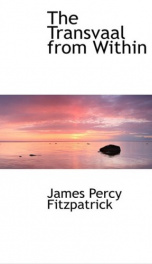The Transvaal from Within

PREFACE: It was originally designed to compile a statement of the occurrences of 1895-6 in the Transvaal and of the conditions which led up to them, in the hope of removing the very grave misunderstandings which existed. Everybody else had been heard and judged, the Uitlander had only been judged. It therefore seemed proper that somebody should attempt to present the case for the Uitlander. The writer, as a South African by birth, as a resident in the Transvaal since 1884, and lastly as Secretary of the Reform Committee, felt impelled to do this, but suffered under the disability of President Kruger's three years' ban; and although it might possibly have been urged that a plain statement of facts and explanations of past actions could not be fairly regarded as a deliberate interference in politics, the facts themselves when set out appeared to constitute an indictment so strong as to make it worth while considering whether the Government of the Transvaal would not regard it as sufficient excuse to put in force the sentence of banishment. The postponement of publication which was then decided upon for a period of three years appeared to be tantamount to the abandonment of the original purpose, and the work was continued with the intention of making it a private record to be printed at the expiry of the term of silence, and to be privately circulated among those who were personally concerned or interested; a record which might perhaps be of service some day in filling in a page of South African history. The private circulation of that work during June of the present year led to suggestions from many quarters that it should be supplemented by a chapter or two dealing with later events and published; and the present volume is the outcome of these suggestions. It is realized that much of what might properly appear in a private record will be considered rather superfluous in a book designed for wider circulation. For instance, a good deal of space is given to details of the trial and the prison life of the Reformers, which are of no interest whatever to the public, although they form a record which the men themselves may like to preserve. These might have been omitted but that the writer desired to make no alterations in the original text except in the nature of literary revision. The writer may be charged by the "peace" party with deliberately selecting a critical and anxious time as opportune to contribute a new factor to those already militating against a peaceful settlement. Two replies could be made to this: one an excuse and one an answer. It would be an excuse that the writer did not deliberately select the time of publication, but that the Transvaal Government in its wisdom chose to impose silence for three years, and that the project with which their action had interfered was resumed at the earliest possible moment. The coincidence of another crisis with the date of emancipation may be an unlucky coincidence, or it may be a result. But there is neither necessity nor intention to offer excuses. The responsibility is accepted and the answer is that a case so sound needs only to be understood, that a recital of the facts must help to dispel the mists of race prejudice and misunderstanding which are obscuring the judgment of many; and that a firm but strictly just and dignified handling of the question by the Imperial Government is the only possible way to avert a catastrophe in South Africa. It is essential therefore that first of all the conditions as they are should be understood; and this record is offered as a contribution to that end. Let the measure of its truth be the measure of its usefulness! --This text refers to the Kindle Edition edition.
Info about the book
Author:
Series:
Unknown
ASIN:
B00849MZO8
Rating:
2.5/5 (4)Your rating:
0/5
Languge:
English
Users who have this book
Users who want this book
What readers are saying
What do you think? Write your own comment on this book!
write a commentif you like The Transvaal from Within try:
Other books by this author
Do you want to exchange books? It’s EASY!
Get registered and find other users who want to give their favourite books to good hands!


